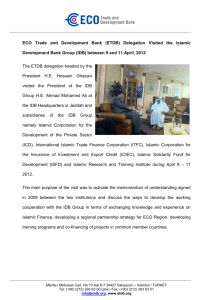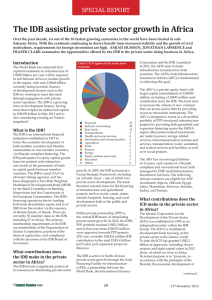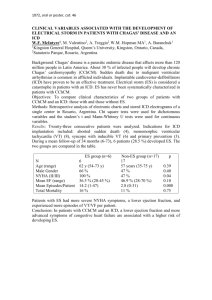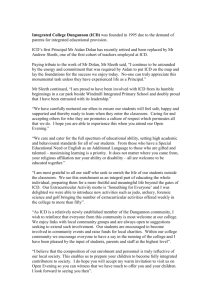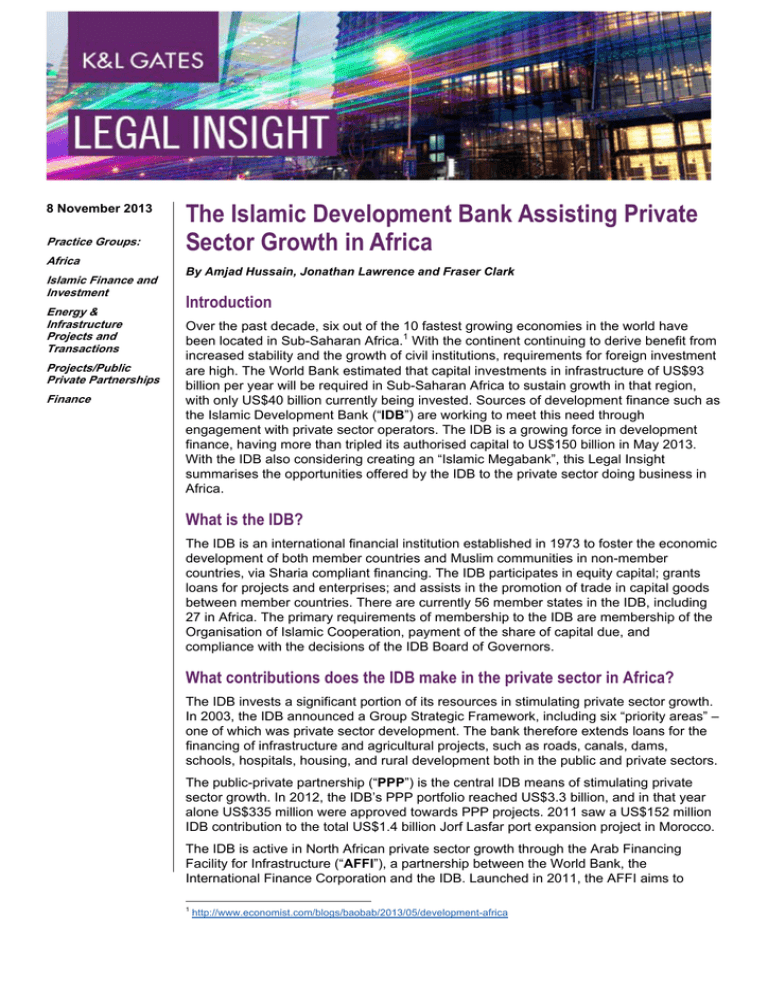
8 November 2013
Practice Groups:
Africa
Islamic Finance and
Investment
Energy &
Infrastructure
Projects and
Transactions
Projects/Public
Private Partnerships
Finance
The Islamic Development Bank Assisting Private
Sector Growth in Africa
By Amjad Hussain, Jonathan Lawrence and Fraser Clark
Introduction
Over the past decade, six out of the 10 fastest growing economies in the world have
been located in Sub-Saharan Africa.1 With the continent continuing to derive benefit from
increased stability and the growth of civil institutions, requirements for foreign investment
are high. The World Bank estimated that capital investments in infrastructure of US$93
billion per year will be required in Sub-Saharan Africa to sustain growth in that region,
with only US$40 billion currently being invested. Sources of development finance such as
the Islamic Development Bank (“IDB”) are working to meet this need through
engagement with private sector operators. The IDB is a growing force in development
finance, having more than tripled its authorised capital to US$150 billion in May 2013.
With the IDB also considering creating an “Islamic Megabank”, this Legal Insight
summarises the opportunities offered by the IDB to the private sector doing business in
Africa.
What is the IDB?
The IDB is an international financial institution established in 1973 to foster the economic
development of both member countries and Muslim communities in non-member
countries, via Sharia compliant financing. The IDB participates in equity capital; grants
loans for projects and enterprises; and assists in the promotion of trade in capital goods
between member countries. There are currently 56 member states in the IDB, including
27 in Africa. The primary requirements of membership to the IDB are membership of the
Organisation of Islamic Cooperation, payment of the share of capital due, and
compliance with the decisions of the IDB Board of Governors.
What contributions does the IDB make in the private sector in Africa?
The IDB invests a significant portion of its resources in stimulating private sector growth.
In 2003, the IDB announced a Group Strategic Framework, including six “priority areas” –
one of which was private sector development. The bank therefore extends loans for the
financing of infrastructure and agricultural projects, such as roads, canals, dams,
schools, hospitals, housing, and rural development both in the public and private sectors.
The public-private partnership (“PPP”) is the central IDB means of stimulating private
sector growth. In 2012, the IDB’s PPP portfolio reached US$3.3 billion, and in that year
alone US$335 million were approved towards PPP projects. 2011 saw a US$152 million
IDB contribution to the total US$1.4 billion Jorf Lasfar port expansion project in Morocco.
The IDB is active in North African private sector growth through the Arab Financing
Facility for Infrastructure (“AFFI”), a partnership between the World Bank, the
International Finance Corporation and the IDB. Launched in 2011, the AFFI aims to
1
http://www.economist.com/blogs/baobab/2013/05/development-africa
The Islamic Development Bank Assisting Private Sector Growth in Africa
foster infrastructure investment in Arab countries. The AFFI’s Arab Infrastructure
Investment Vehicle (“AIIV”) is key to achieving this goal.
The AIIV is a private equity fund with target capital commitments of US$300 million,
including a US$50 million seed contribution from the IDB. The fund aims to increase the
volume of new ventures that can access senior debt by providing access to mezzanine
instruments. The AIIV is designed to invest in a diversified portfolio of PPP-structured
infrastructure projects by providing both greenfield and expansion financing across the
MENA region. Mezzanine-related investments are made in power, energy-related
services, telecommunication systems and services, transportation, water, sanitation and
related services and facilities, as well as in social projects. The AIIV has an envisaged
lifetime of 12 years, and consists of a Sharia compliant and conventional fund, both
managed by EMP Arab Infrastructure Investment Advisors. The following African
countries are eligible for AIIV investment: Algeria, Djibouti, Egypt, Libya, Mauritania,
Morocco, Somalia, Sudan, and Tunisia.
What contributions does the Islamic Corporation for the Development of the
Private Sector make in the private sector in Africa?
The Islamic Corporation for the Development of the Private Sector (“ICD”) was
established in 1999 as an independent entity within the IDB group. The ICD is a
multilateral development bank focusing on the private sector in the Islamic world. To date
the ICD has granted US$2.2 billion of approvals, including 18 new projects and eight
capital raises in 2012 alone, of which six were in Africa. Its stated purpose is to “promote,
in accordance with the principles of the Shari’ah, the economic development of its
member countries by encouraging the establishment, expansion and modernisation of
private enterprises producing goods and services in such a way as to supplement the
activities of the [IDB].”2 In practice, this takes the form of offering long-term and shortterm financing and advisory/arrangement services, including offering leveraged finance to
partners to extend their capabilities, establishing partnerships at the strategic or tactical
level, targeting direct financing of the private sector, and injecting selective equity and
debt products into projects that demonstrate strong potential to develop the private
sector. A recent example of the ICD’s work was the signing of a memorandum of
understanding on 29 July 2013 to form a joint venture between the ICD and Korea’s
Kolon Industries, Inc. to establish a pharmaceutical plant in Cote d'Ivoire.3
The ICD’s authorised capital stands at US$2 billion, of which US$1 billion is available for
subscription. The ICD’s shareholders consist of 52 nations (including Nigeria, Senegal
and Guinea), five financial institutions, and the IDB itself, which respectively contribute
30%, 50% and 20% of the organisation’s share capital.
The ICD’s Articles empower the organisation to assist in financing the establishment,
expansion and modernisation of private enterprises; to facilitate their access to private
and public capital; and to stimulate the development of investment opportunities
conducive to the flow of private capital.4 Furthermore, the Articles grant the ICD powers
to identify private sector projects and make direct investments in them through Islamic
instruments, in accordance with the ICD’s Investment Policies.5
2
Paragraph 1, Article 3 of ICD Articles of Agreement
http://www.icd-idb.com/irj/portal/anonymous/icd_news_en
4
Article 4
5
Article 6
3
2
The Islamic Development Bank Assisting Private Sector Growth in Africa
The ICD offers three sets of Sharia-compliant business products and services to its
private sector clients in member countries:
1. Financing and investment products, in the form of both term financing and equity
contribution to private sector greenfield projects or those that are under expansion or
modernisation. Short-term financing to cover working capital with a tenor of up to 24
months is also available.
2. Advisory services, including assessing the business environment of member countries
along with any required reform actions.
3. Asset management, by sponsoring, managing and participating in private equity funds
and other special purpose vehicles, designed to invest in accordance with the ICD
mandate, such as the US$600 million ICD Food and Agriculture Fund, launched in
June 2012.
In terms of the projects favoured by the ICD, the following chart shows a breakdown by
sector of all projects approved since inception:
ICD Approvals by Sector since Inception
Financial (33)
Industry and Mining (20)
Real Estate (12)
Transportation (4)
Health and Social Services
(4)
Information and
Communication (3)
Agriculture (3)
Trade (2)
Finance (2)
Energy (2)
Water, Sanitation, Waste (2)
Education (1)
Other (6)
The ICD’s Islamic finance development in Sub-Saharan Africa is carried out through
Tamweel Africa, an ICD-partnered company based in Senegal. Tamweel Africa invests
and manages stakes in Islamic banks. Currently, Tamweel is active in Guinea,
Mauritania, Niger and Senegal with plans to expand across the continent.
3
The Islamic Development Bank Assisting Private Sector Growth in Africa
How to apply for ICD support
The ICD is composed of a General Assembly, a Board of Directors, an Executive
Committee, Investment Committee, Advisory Board, Audit Committee, and a Sharia
Committee. The ICD manages its investment portfolio via the application of a set of
financial, technical, economic, legal, environmental and institutional feasibility and
assessment studies. Investments may only be made by the ICD in enterprises either
located in member countries, or working exclusively for the benefit of those countries.6
Furthermore any financing is dependent on the approval of that member country.7 There
are seven stages in the life cycle of a project:
1. Project Origination: projects are sourced either through the ICD Business
Development team, or directly from the client. Compliance with the ICD’s guidelines is
checked, and a report compiled analysing the developmental impact of the project;
2. Project Appraisal: due diligence report and financing term sheet are completed;
3. Investment Committee: approves due diligence report and term sheet;
4. Executive Committee: approves final financing conditions and a project information
memorandum is presented to the Executive Committee prior to a final decision on
behalf of the Board of Directors;
5. Effectiveness of the project is sanctioned, disbursement is made;
6. Monitoring and Evaluation: ICD follow-up team closely monitors the project’s
progression; and
7. Project Closing: ICD closes its books on the project once the investment has been
repaid in full or the corporation exits by selling its stake.
Islamic Megabank
The idea of a so-called “Islamic Megabank” has been under discussion for several years.
Such a Sharia-compliant bank would provide liquidity management solutions to help
facilitate the development of an Islamic inter-bank market, including in Africa. The
institution would remedy the paucity of senior Islamic financiers, Sharia-compliant stock
exchange tools, and the absence of market liquidity between Islamic banks. Furthermore,
few central banks issue liquidity instruments compliant with Islamic law, forcing Islamic
banks to place their liquidity with large conventional banks. An Islamic Megabank also
would provide a Sharia-compliant lender of last resort to the sector.
Such a megabank is yet to have been established; however, it was reported8 in May
2013 that a memorandum of understanding was signed by the IDB, the Dallah Albaraka
Group and the Qatari government towards creating such a bank. The details of the
institution are yet to emerge; however, should an Islamic Megabank be realised, Islamic
financing costs would fall, leading to a growth in the sector, including the IDB’s own
lending programs in Africa.
6
Article 15 paragraph 1
Article 15 paragraph 2
8
http://asia.ipe.com/asia/islamic-development-bank-plans-shariah-mega-bank_52751.php
7
4
The Islamic Development Bank Assisting Private Sector Growth in Africa
Conclusion
In conclusion, the IDB’s approach to development through private sector growth
continues to provide a wealth of opportunities to private sector players to contribute to
and expedite the growth of stability and wealth on the African continent.
For more information about our Islamic Finance practice, please click here, and for more
information about our Africa practice, please click here.
Authors:
Amjad Hussain
amjad.hussain@klgates.com
+974.4424.6119
Jonathan Lawrence
jonathan.lawrence@klgates.com
+44.(0).20.7360.8242
Fraser Clark
fraser.clark@klgates.com
+44.(0).20.7360.8138
Anchorage Austin Beijing Berlin Boston Brisbane Brussels Charleston Charlotte Chicago Dallas Doha Dubai Fort Worth Frankfurt
Harrisburg Hong Kong Houston London Los Angeles Melbourne Miami Milan Moscow Newark New York Orange County Palo Alto
Paris Perth Pittsburgh Portland Raleigh Research Triangle Park San Diego San Francisco São Paulo Seattle Seoul Shanghai
Singapore Spokane Sydney Taipei Tokyo Warsaw Washington, D.C. Wilmington
K&L Gates practices out of 48 fully integrated offices located in the United States, Asia, Australia, Europe, the
Middle East and South America and represents leading global corporations, growth and middle-market
companies, capital markets participants and entrepreneurs in every major industry group as well as public
sector entities, educational institutions, philanthropic organizations and individuals. For more information
about K&L Gates or its locations, practices and registrations, visit www.klgates.com.
This publication is for informational purposes and does not contain or convey legal advice. The information herein should not be used or relied upon
in regard to any particular facts or circumstances without first consulting a lawyer.
©2013 K&L Gates LLP. All Rights Reserved.
5

